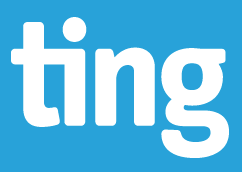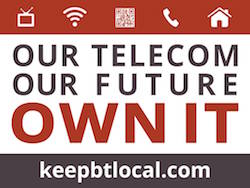
And then there were three. After months of review and vetting, the field of bidders to purchase Burlington, Vermont’s, treasured municipal network is now a manageable number. On September 20th, city officials announced which entities were still in the running and released details of their proposals.
Ting
Toronto company Ting, which is owned by Tucows, submitted a bid to purchase the network. The company is already providing services in Charlottesville, Virginia; Holly Springs, North Carolina; and in Westminster, Maryland, where the public-private partnership has received several awards. The company is also planning construction in Sandpoint, Idaho, and Centennial, Colorado, where they will also be partnering with the municipalities to use publicly owned fiber.
They describe the key points of their offer as $27.5 million in cash and they will pay the city an additional $500,000 if BT earns $4.25 million earnings before interest, tax, depreciation, and amortization (EBITDA) during the 2018 fiscal year. Ting is offering the city a minority interest in the network that they can later divest if they choose.
 Ting will also relocate BT’s equipment, currently housed in the city’s Memorial Auditorium. The move is estimated to cost $800,000. As part of the deal, the company will also donate $250,000 toward the city’s Burlington Ignite and other programs to encourage entrepreneurship and closing the digital divide.
Ting will also relocate BT’s equipment, currently housed in the city’s Memorial Auditorium. The move is estimated to cost $800,000. As part of the deal, the company will also donate $250,000 toward the city’s Burlington Ignite and other programs to encourage entrepreneurship and closing the digital divide.
In their offer, Ting guarantees expansion within the city and beyond the city limits. Like the other bidders, Ting plans to keep the current operational team in place. They also guarantee customer rates for 30 months.
Review the details of the Ting/Tucows offer here.
Schurz
Schurz Communications is a family owned company headquartered in Indiana, operating for more than 144 years. The company began with the South Bend Tribune in 1872 and family members still hold editor and publisher positions. The establishment also holds assets in radio and television and began acquiring cable networks in the 1950s. They own networks in Hagerstown, Maryland; Maricopa, Arizona; and Sergeant Bluff, Iowa.
Schurz has offered $30.8 million in cash to Burlington and, while they have not established an additional figure, they will consider adding more to the price if BT surpasses EBITDA goals. The company is also offering the community a chance to retain a percentage of the operation of up to 33 percent, if the city contributes investment.
 The Schurz offer also stresses the importance of local involvement as the bidders plan to leave current teams in place. They guarantee broadband rates for five years. The company plans to expand the network in keeping with BT’s current schedule, which established 2019 as a deadline. Schurz states that they are committed to spending between $6.2 million and $8.84 million on capital projects for BT’s 2019 - 2021 capital plan.
The Schurz offer also stresses the importance of local involvement as the bidders plan to leave current teams in place. They guarantee broadband rates for five years. The company plans to expand the network in keeping with BT’s current schedule, which established 2019 as a deadline. Schurz states that they are committed to spending between $6.2 million and $8.84 million on capital projects for BT’s 2019 - 2021 capital plan.
The offer doesn’t commit a specific dollar amount, but Schurz expresses support for the BT Ignite program and vows to continue the low-income program in place. They also promise to seek out other opportunities to bring connectivity to the Burlington community.
Read the details of the Schurz offer here.
Keep BT Local
When the settlement with Citibank included a provision forcing the city to sell BT, Burlington residents mobilized. After searching for ways to keep their network, they determined that forming a broadband cooperative was their best option. In Burlington, they have experience with the process, having established a similar entity to take over the City Market.
The Keep BT Local offer requires the city to retain 12.5 percent ownership in the network, while subscribers/members own shares in the remaining 87.5 percent. Because the city uses the network, it will also be a member and all subscribers will automatically receive membership interest.
 The price Keep BT Local plans to pay is $12 million in total with $10.5 million in cash loaned to the cooperative from Maine Fiber Company, $1 million the co-op has obtained through commitments from members, and the $1.5 million non-cash equity that is the value of the city’s 12.5 percent ownership.
The price Keep BT Local plans to pay is $12 million in total with $10.5 million in cash loaned to the cooperative from Maine Fiber Company, $1 million the co-op has obtained through commitments from members, and the $1.5 million non-cash equity that is the value of the city’s 12.5 percent ownership.
Keep BT Local’s offer includes infusing $500,000 of the cash into the network as working capital. They intend to fulfill the planned buildout as scheduled. There are 120 premises that the other two offers will not commit to serving due to the projected expense of reaching them, but Keep BT Local’s offer includes language that suggests they will explore options to serve 100 percent of the community.
As expected, they will keep operating and management crews in place. Keep BT Local has established a relationship with Maine Fiber Company as a resource to help them with management or operational issues associated with running the network.
Read details of the Keep BT Local offer here.
Anti-Monopoly Provisions
Ting and Schurz have committed to restrict any future sale of the network to purchasers that would not result in a monopoly in the market. Keep BT Local doesn't anticipate any sale and has stressed the value of the cooperative model beyond how much cash the asset is worth:
It is understood by members of the Burlington community that there is a long-term value to BT that City Council and its advisors must understand goes beyond simply the financial returns from the acquisition. As such, KBTL’s bid is formulated on the idea that the value of BT should not be based on what private enterprise can pay, but what the community will receive in return.
Burlington Telecom was built on the belief that an advanced fiber to home/business network will have long term returns for the community, which must be protected carefully by Burlington’s city leaders, even if the city cannot retain full ownership. KBTL believes that community equity – that is, the meaningful claim of residents of Burlington to maintain their right to have a return on their original investment in Burlington Telecom and representation in the governance of this public utility after it is sold – must be the primary consideration in determining how this asset should be managed. KBTL, as a subscriber/member owned cooperative, can genuinely reflect the wishes of Burlingtonians and subscribers of BT now and in the future.
The Process From Here
The public had expected four finalists, but one dropped out at the last minute, raising concerns once again about the transparency of the process. Mayor Weinberger, who has stated that he doesn’t support the Keep BT Local bid, was accused of encouraging the fourth bidder to withdraw without input from the City Council. The tension between the council and the Mayor complicate an already difficult and drawn out process.
 Members in the community have expressed their support for a cooperative model in the local media and by committing financially so the cooperative can make its offer. BT has done well in recent months, surpassing goals and taking steps to implement a low-cost Internet access program for the community.
Members in the community have expressed their support for a cooperative model in the local media and by committing financially so the cooperative can make its offer. BT has done well in recent months, surpassing goals and taking steps to implement a low-cost Internet access program for the community.
Now, it’s up to locals to review the proposals and let city officials know which they consider best for Burlington. The city is accepting feedback via email at btfeedback@burlingtonvt.gov.
The bids go to an accountant and a telecommunications firm that will provide analysis to the City Council who hope to eliminate one of the bidders by October 2nd. The city will then choose a buyer on October 16th and present the potential deal to the Public Utility Commission, which must issue a certificate of public good before the sale can be finalized.







